Digital Scholarship / Digital Humanities
Online resources
(Some are open access scholarly journal articles or monograph chapters)
-
The #DHattheCC Project: Digital Humanities Needs Community CollegesRavy, Tanya - In the Pedagogy & American Literary Studies blog, Ravy, a PhD Candidate at George Washington University and an instructor at Northern Virginia Community College, provides some insights she gained in the community college classroom and through working with the Digital Humanities at the Community College (#DHattheCC) group.
-
Bringing digital humanities to the community college and vice versaMcGrail, Anne - A white paper on considering how community colleges can better participate in and contribute to the multiple ongoing conversations about digital humanities teaching and research.The project will initiate a much needed nationwide dialogue regarding the lack of community college participation in, and contribution to digital humanities. The project's short-term outcome is the engagement of national thinkers, experts and community college stakeholders in a national conversation that will begin the longer discussion of how to improve community college engagement with digital humanities (a conversation that has been sorely lacking).
-
Community CollegeMcGrail, Anne; Zino, Dominique; Cardenas, Jaime; Holmstrom, Bethany - In Digital Pedagogy in the Humanities, a peer-reviewed, curated collection of reusable and remixable resources for teaching and research, the authors discuss how an equitable digital humanities vision should embrace community college students and the faculty who teach them.
-
Doing DH at the CC (blog)McGrail, Anne - Professor of English at Lane Community College, McGrail discusses her use of digital humanities in her teaching.
-
An Institute for Community College Digital Humanists: Beyond Pockets of Innovation, Toward a Community of PracticeMcGrail, Anne - White paper that outlines a one-week institute for community college faculty to engage with new digital methods, tools and practices for humanities teaching and scholarship. Participants worked with experts to translate current theory and practice in DH for the unique learning needs of community college students in open-access institutional contexts.
-
Micro DH: Digital Humanities at the Small ScaleRisam, Roopika; Edwards, Susan - From the Digital Humanities 2017 Conference, the premier annual conference of the international Alliance of Digital Humanities Organizations, the authors describe their efforts at Salem State University.
-
Open Source in Open Access Environments: Choices and NecessitiesMcGrail, Anne - A paper from the Modern Language Association (MLA) 2017 session "Minimal Computing: Choice or Necessity?" that describes that concept and how it impacts community college students' participation.
-
Possibilities for Digital Humanities at Community CollegesSpiro, Lisa - Slides from a presentation at Houston Community College’s Spring 2019 English & Humanities Colloquium on “The Digital Classroom: Humanities, Literature & Composition.”
-
Undergraduate Students and Digital Humanities Belonging: Metaphors and Methods for Including Undergraduate Research in DH CommunitiesMurphy, Emily Christina; Smith, Shannon R. - Article in the open-access, peer-reviewed, digital journal Digital Humanities Quarterly that describes the value of DH for undergraduates using experiences at the Undergraduate Summer Field School in the Digital Humanities (DHFS) at Queens University.
-
Using Digital Humanities in the Classroom: A Practical Introduction for Teachers, Lecturers, and Students web companionBattershill, Claire; Ross, Shawna - The web companion to the book of the same name (available in the RVCC Library), this site provides links, tips, and articles on topics related to teaching with digital humanities tools, ideas, and methods.The site is built on Scalar, the multimodal online publishing platform!
-
“Starting From Scratch”? Workshopping New Directions in Undergraduate Digital HumanitiesChristian-Lamb, Caitlin; Shrout, Anelise Hanson - Article in the open-access, peer-reviewed, digital journal Digital Humanities Quarterly that discusses a a workshop held at the ADHO (Alliance of Digital Humanities Association) DH2015 conference.
-
The “Whole Game”: Digital Humanities at Community CollegesMcGrail, Anne - In Debates in the Digital Humanities 2016, an open access monograph published by the University of Minnesota Press, McGrail discusses how digital humanities need community colleges and vice versa.Matthew K. Gold and Lauren F. Klein, Editors
Articles from library databases
-
A 21st-Century Humanities for the Community CollegeAlford, Barry; Elden, Lucia - This essay examines not only the role the humanities play in the community college curriculum but also how our approach to and understanding of the humanities must change. The defense of a 21st-century humanities has to begin in the experience of our students and not in the traditional canons of our disciplines.From New Directions for Community Colleges. Fall 2013, Vol. 2013, Issue 163
-
The Digital Literacy Partnership Website: Promoting Interdisciplinary Scholarship Between Faculty, Students, and LibrariansTzoc, Elias; Ubbes, Valerie A. - This article describes a collaborative project using the platform Omeka.From New Review of Academic Librarianship. 2017, Vol. 23, Issue 2/3.
-
Doing Humanities Scholarship Online: A Case Study for the Literary Digital Humanities Writing CourseGould, Amanda Starling - This article presents a case study about Duke University's undergraduate media-based literary digital humanities writing course, Augmenting Realities.From Interdisciplinary Humanities. Spring2014, Vol. 31 Issue 1
-
Library Instruction for Digital Humanities Pedagogy in Undergraduate ClassesVarner, Stewart - This book chapter describes ways librarians and teaching faculty can partner to offer digital humanities pedagogy, and provides examples of potential projects for undergraduate students.From White, John W. and Heather Gilbert. Laying the Foundation: Digital Humanities in Academic Libraries. Purdue University Press, 2016.
-
Using Zombies to Teach Collaborative Scholarship and Born-Digital PublishingThomas, Jamie A. - The author describes the collaborative project [ZOMBIES REIMAGINED] at Swarth College, which uses open access tools to create a Creative Commons-licensed online publication.From Bulletin of the Association for Information Science & Technology. Jun/Jul2017, Vol. 43, issue 5
-
Visualizing History in the Classroom: A Faculty-Librarian Partnership in the Digital AgeLach, Pamella R; Pollard, Elizabeth A. - This case study describes a long-term collaboration between a Digital Humanities (DH) librarian and a History professor. We trace our two-year partnership from inception and test-run in a small undergraduate seminar to a scaled-up and carefully-designed DH intervention for visualizing spatial and temporal historical arguments in a course with three times the number of students.From New Review of Academic Librarianship. Apr-Dec 2019, Vol. 25, Issue 2-4
Books in the Library
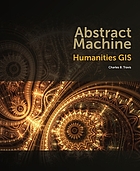
Abstract machine: humanities GIS
In Abstract Machine, author Charles Travis uses GIS technology to interpret, analyze, and visualize literary, historical, and philosophical texts. Travis's study shows how mapping language patterns, fictional landscapes, geographic spaces, and philosophical concepts helps support critical analysis (eBook).
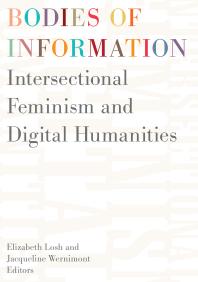
Bodies of Information: Intersectional Feminism and the Digital Humanities
A wide-ranging, interconnected anthology presents a diversity of feminist contributions to digital humanities. In recent years, the digital humanities has been shaken by important debates about inclusivity and scope--but what change will these conversations ultimately bring about? Can the digital humanities complicate the basic assumptions of tech culture, or will this body of scholarship and practices simply reinforce preexisting biases (eBook)?

Critical digital humanities: the search for a methodology
Explores the opportunities and complications faced by humanists in this new era. Though the study and interpretation of texts alongside computational tools can serve scholarship, these methods cannot replace existing frameworks. Ideas of scientific validity cannot be adapted for humanities research because digital humanities, unlike science, lack a leading-edge horizon charting the frontiers of inquiry. Instead, the methods of digital humanities require a constant rereading.
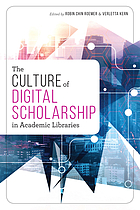
The culture of digital scholarship in academic libraries
At the heart of digital scholarship are universal questions, lessons, and principles relating both to the mission of higher education and the shared values that make an academic library culture. But while global in aspirations, digital scholarship starts with local culture drawn from the community.
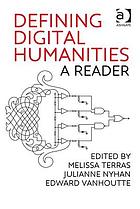
Defining digital humanities: a reader
This reader brings together, for the first time, in one core volume the essential readings that have emerged in Digital Humanities. We provide a historical overview of how the term 'Humanities Computing' developed into the term 'Digital Humanities', and highlight core readings which explore the meaning, scope, and implementation of the field (eBook).
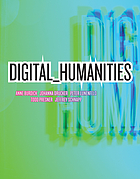
Digital humanities
This collaboratively authored and visually compelling volume explores methodologies and techniques unfamiliar to traditional modes of humanistic inquiry--including geospatial analysis, data mining, corpus linguistics, visualization, and simulation--to show their relevance for contemporary culture (eBook).
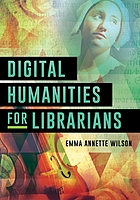
Digital humanities for librarians
The book begins by introducing digital humanities and addressing key questions such as "What is it?" "Who does it?" "How do they do it?" "Why do they do it?" and "How can I do it?" This broad overview is followed by a series of practical chapters answering those questions with step-by-step approaches to both the digital and human elements of digital humanities librarianship.
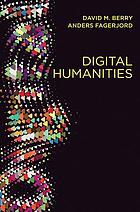
Digital humanities: knowledge and critique in a digital age
The digital humanities give us powerful tools and methods for thinking about culture and history in the contemporary world, through the use of sophisticated computing techniques and methods. This book explores the history, intellectual work, key arguments and ideas of this emerging discipline, and suggests ways in which the humanities can be enriched through computing, but also how cultural critique can transform the digital humanities.
Digital technology and the practices of humanities research
This book brings theoretical and practical perspectives into conversation, offering readers not only comprehensive examinations of past and present discourse on digital scholarship, but tightly-focused case studies. This timely volume illuminates the different forces underlying the shifting practices in humanities research today, with especial focus on how humanists take ownership of, and are empowered by, technology in unexpected ways.
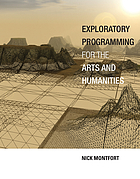
Exploratory programming for the arts and humanities
A book for anyone who wants to learn programming to explore and create, with exercises and projects to help the reader learn by doing. This book introduces programming to readers with a background in the arts and humanities; there are no prerequisites, and no knowledge of computation is assumed. In it, Nick Montfort reveals programming to be not merely a technical exercise within given constraints but a tool for sketching, brainstorming, and inquiring about important topics. He emphasizes programming's exploratory potential—its facility to create new kinds of artworks and to probe data for new ideas.
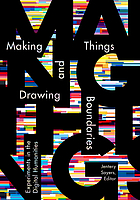
Making things and drawing boundaries: experiments in the digital humanities
Foregrounding the interdisciplinary character of experimental methods and hands-on research, this collection asks what it means to make things in the humanities. How is humanities research manifested in hand and on screen alongside the essay and monograph? And, importantly, how does experimentation with physical materials correspond with social justice and responsibility?
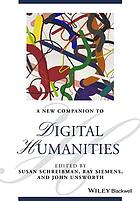
A New Companion to Digital Humanities
Accessibly structured into five sections exploring infrastructures, creation, analysis, dissemination, and the future of digital humanities, this book surveys the past, present, and future of the field, offering essential research for anyone interested in better understanding the theory, methods, and application of the digital humanities (eBook).
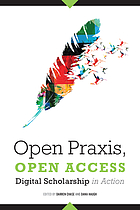
Open praxis, open access: digital scholarship in action
Many in the world of scholarship share the conviction that open access will be the engine of transformation leading to more culture, more research, more discovery, and more solutions to small and big problems. This collection brings together librarians, scholars, practitioners, policymakers, and thinkers to take measure of the open access movement.
Quantitative Methods in the Humanities
This guide is intended for students and scholars working on all historical periods and topics in the humanities and social sciences--especially for those who do not think of themselves as experts in quantification, "big data," or "digital humanities." The authors reveal quantification to be a powerful and versatile tool, applicable to a myriad of materials from the past. Their book, accessible to complete beginners, offers detailed advice and practical tips on how to build a dataset from historical sources and how to categorize it according to specific research questions.
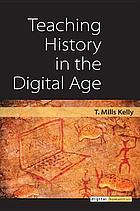
Teaching history in the digital age
Teaching History in the Digital Age serves as a guide for practitioners on how to fruitfully employ the transformative changes of digital media in the research, writing, and teaching of history. T. Mills Kelly synthesizes more than two decades of research in digital history, offering practical advice on how to make best use of the results of this synthesis in the classroom and new ways of thinking about pedagogy in the digital humanities.
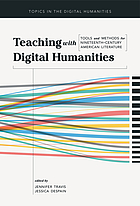
Teaching with digital humanities: tools and methods for nineteenth-century American literature
Scholars of nineteenth-century American literature have been at the forefront of digital humanities scholarship with several of the most successfully funded and publicized digital projects, including The Walt Whitman Archive, the Emily Dickinson Electronic Archive, and the Melville Electronic Library. This collection brings together several scholars who are foundational to the development of digital humanities and to the building of nineteenth-century American digital archives alongside scholars who have made digital methods central to their pedagogy.
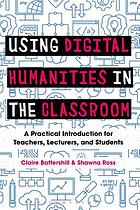
Using digital humanities in the classroom: a practical introduction for teachers, lecturers, and students
Rooted in the day-to-day experience of teaching and written for those without specialist technical knowledge, this book is the first practical guide to using digital tools and resources in the humanities classroom.
- Last Updated: Aug 7, 2025 3:50 PM
- URL: https://library.raritanval.edu/digschol
- Print Page
